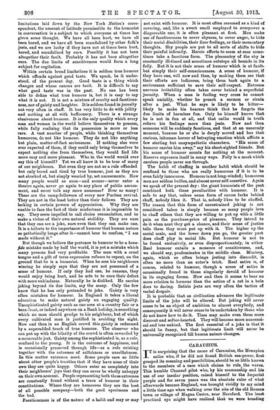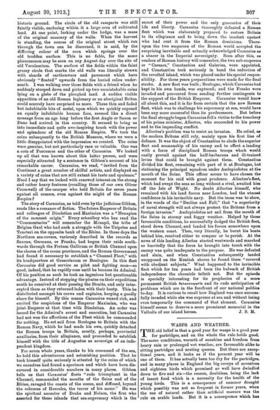CARAUSIUS.
IT is surprising that the name of Carausitts, the Menapian sailor who, if he did not found British sea-power, first grasped its meaning and possibilities, should be so little known to the members of a race which claims to rule., the waves. This humble Channel pilot who, by his seamanship and his use of our insular position, raised himself to the Imperial purple and for seven years was the absolute ruler of what afterwards became England, was brought vividly to my mind a little time ago when walking over the site of the old Roman town or village of Magna Castro, near Hereford. The least practised eye might have realized that we were treading
historic ground. The circle of the old ramparts was still faintly visible, enclosing within it a large area of cultivated land. At one point, lurking under the hedge, was a mass of the original masonry of the walls. When the harvest is standing, the course of the original street which ran through the town can be discerned, it is said, by the differing colour of the corn which springs over the old trodden surface. This is no fable, for the same
phenomenon may be seen on any August day over the site of old Verulamium. The surface of the fields within the faint grassy circle that marks the old walls was literally strewn with shards of earthenware and pavement which have obviously " floated " upwards from the buried relics under- neath. I was walking over these fields with a friend when he suddenly stooped down and picked up two unmistakable coins lying on a glebe of the ploughed land. A sudden visible apparition of an old Roman legionary or an aboriginal Briton could scarcely have surprised us more. These thin and faded but indubitable bits of metal, upon which we quickly exposed an equally indubitable human face, seemed like a direct message from an age long before the first Angle or Saxon or Dane had arrived in this country. It seemed to bring us into immediate and quite awe-inspiring touch with the power and splendour of the old Roman Empire. We took the coins subsequently to the British Museum, where we were a little disappointed with the impression we created. The coins were genuine, but not particularly rare or valuable. One was a coin of Postumus and the other of Carausius. We looked up all that was known about this latter person, and were especially attracted by a sentence in Gibbon's account of his remarkable career. Carausins, we read, " invited from the Continent a great number of skilful artists, and displayed on a variety of coins that are still extant his taste and opulence." Need I say that we looked with renewed interest on the strong and rather heavy features (recalling those of our own Oliver Cromwell) of the usurper who held Britain for seven years against all comers, even against the might of the Roman Empire P
The story of Carausius, as told even by the judicious Gibbon, reads like a romance of fiction. The future Emperor of Britain and colleague of Diocletian and Maximian was a " Menapian of the meanest origin." Every schoolboy who has read the "Commentaries" will remember the Menapii, the tribe of Belgian Gaul who had such a struggle with the Usipetes and Tencteri on the opposite bank of the Rhine. In those days the Northern sea-rovers, variously described in the records as Saxons, Germans, or Franks, had begun their raids south- wards through the Fretum Gallicum or British Channel upon the shores of the ocean provinces, and the Roman Government had found it necessary to establish a " Channel Fleet," with its headquarters at Gessoriacum or Boulogne. In this fleet Carausius did good service as pilot and fighting man—so good, indeed, that he rapidly rose until he became its Admiral. Of his position as such he took an ingenious but questionable advantage. Instead of stopping the pirates on their expeditions south he connived at their passing the Straits, and only inter- cepted them as they returned laden with their booty. This he distributed amongst his crews and captains, keeping a goodly share for himself. By this means Carausius waxed rich, and excited the suspicions of the Emperor Afaximian, who was joint Emperor at that time with Diocletian. An order was issued for the Admiral's arrest and execution, but Carausius bad not won the affections of the Fleet which be commanded for nothing. He set sail from Boulogne to Britain with the Roman Navy, which he bad made his own, quickly detached the Roman troops in Britain, mostly, perhaps, provincial auxiliaries, from their allegiance, and proceeded to establish himself with the title of Augustus as sovereign of an inde- pendent kingdom.
For seven whole years, thanks to his command of the sea, he held this adventurous and astonishing position. That he took himself quite seriously is attested by the coins of which we ourselves had found a specimen and which have been dis- covered in considerable numbers in many places. Gibbon tells us that Carausius' fleets "rode triumphant in the Channel, commanded the mouths of the Seine and of the Rhine, ravaged the coasts of the ocean, and diffused, beyond the columns of Hercules, the terror of his name." He was the spiritual ancestor of Drake and Nelson, the first who asserted for these islands that sea-supremacy which is the secret of their power and the only guarantee of their 1.fe and liberty. Carausius thoroughly defeated a Roman fleet which was elaborately prepared to restore Britain to its allegiance and to bring down the insolent upstart who had rent it from the Roman dominions. There- upon the two emperors of the Roman world accepted ths surprising inevitable and actually acknowledged Carausius as a sharer in the Imperial sovereignty. Soon after this, as readers of Roman history will remember, the two sub-emperors or " Caesars," Constantius and Galerius, were appointed, and Constantius took seriously in hand the reduction of the revolted island, which was placed under his special respon- sibility. For three years preparations were made for the final stroke. A new fleet was built ; Boulogne, which Carausius had kept in his own hands, was captured; and the Franks were invaded and prevented from sending further contingents to the support of the British Emperor. Carausius would know all about this, and it is far from certain that the new Roman fleet, which was to challenge his supremacy at sea, would have been any more successful than its predecessors. But before the final struggle began Carausius fell a victim to the treachery of his prime minister, Allectus, who succeeded to his power and to the impending conflict.
Allectus's problem was to resist an invasion. He relied, as the modern Britons still rely, mainly upon his first line of defence. It was the object of Constantius to elude the superior fleet and seamanship of his enemy and to effect a landing with a force of disciplined Roman troops which would easily prevail against the half-barbarous and ill-trained levies that could be brought against them. Constantiva divided his fleet, remaining with part of it at Boulogne, Lut stationing the principal squadron under Asclepiodotus at the mouth of the Seine. This officer seems to have chosen the moment for his raid with great prudence. Allectus's fleet., which had swept the seas so long without a rival, awaited him off the Isle of Wight. No doubt Allectus himself, who remained with his land forces near London, had the utmost confidence in his invincible navy. But the issue was to show, in the words of the "Decline and Fall," that "a superiority of naval strength will not always protect the Britons from a foreign invasion." Asclepiodotus set sail from the mouth of the Seine in stormy and foggy weather. Helped by those favourable conditions, he successfully dodged the British fleet., stood down Channel, and landed his forces somewhere upon the western coast. Then, very literally, he burnt his boats behind him, resolved either to conquer or to perish. At the news of this landing Allectus started westwards and marched so hurriedly that the force he brought into touch with the enemy was quite inadequate to the purpose. He was defeated and slain, and when Constantius subsequently landed unopposed on the Kentish shores he found them "covered with obedient subjects." What happened to the invincible fleet which for ten years had been the bulwark of British independence the chronicle telletb not. But the episode is specially interesting for its prophecies of a more permanent British eaxaucroKparta and its rude anticipation of problems which are in the forefront of our national politics to-day. It is curious to recall how England was once success- fully invaded while she was supreme at sea and without losing even temporarily the command of that element. Carausius himself seems to deserve a more prominent memorial in the



































 Previous page
Previous page